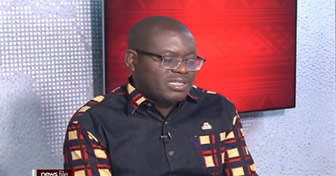The Vice President of IMANI Africa has said government's easing of more restrictions in the country as part of measures to combat the Covid-19 pandemic is reasonable.
Bright Simons said the measures so far are the best but there is a need for government to provide more details on the facts that led to the taking of the decision.
"How diseases are moving from one place to another, where the hotspots are emerging and why," he told host Samson Anyenini on Newsfile are some details government needs to provide.
The President on May 31 eased some restrictions placed on some activities in the country as a means to contain the spread of the novel coronavirus.
The President said this is part of measures to return lives to normalcy while mitigating the effects of coronavirus in the country.
In this regard, an earlier ban on social gathering which had restrained religious activities including church, gathering of Muslims, funerals, and weddings in the country, was eased but with a maximum of not 100 persons.
A previous ban school has been eased for final year students of Junior High Schools, Senior High School, and tertiary students to resume school while the other students remain at home.
Mr. Simons said these measures are reasonable because Covid-19 cannot restrict lives forever.
"We’ve come to the conclusion that we don’t have the silver bullet to this pandemic and attempts to suppress it completely are not very realistic so the measures are the best so far.
"They are the best optimal measures available given the circumstances; which is to attempt somewhat to remove some of the repressions and some of the restrictions on people's right but not to make it unfitted. So I completely agree that these measures in the way that they have been couched are reasonable," he said.
"Of course, the first attempt at formulating them has not met with the satisfaction of the religious leaders and some of them have said that unless additional clarifications are done, they are not going to meet but we also have religious organisations in this country who have said that notwithstanding the civic measures they intend as religious leaders is to instruct their flock to remain at home," he said.
But Mr Simons said the question is about the management of the process.
"It's very much the case that what has to happen is that government has to try and spread out the infections as much as it can. There isn’t any modelling that I am privy to that suggests that the non-pharmaceutical interventions that are currently in place are having the effect of stretching.
"So we will need to see more efforts made at better understanding the transmission dynamics i.e how diseases are moving from one place to another, where the hotspots are emerging and why. We will need at least a few published papers from the Covid-19 committee," he said.
Latest Stories
-
H4P Organization champions inclusive healthcare for PWDs at Accra Rehabilitation Centre
5 minutes -
COMSYS Ghana Ltd crowned Enterprise Solution Provider and Network Infrastructure Company of the Year
6 minutes -
Andy Dosty leaves Hitz FM’s morning show for new afternoon programme
13 minutes -
Hitz FM unveils new programming line-up, promises a refreshing radio experience
21 minutes -
Kensei-Kai Foundation partners W.K.M Karate Association to roll out high school karate in Wa
24 minutes -
2 more youths shot at Nkwanta outskirts as violence continues
35 minutes -
Speaker decries low female representation in parliament; calls for reforms
37 minutes -
Ace Liam: 2-year-old Ghanaian Guinness World Record sensation bags Global Award
42 minutes -
NSMQ 2025: Methodist SHTS, Berekum qualifies for national championship for the 2nd time
43 minutes -
Gov’t increases LEAP budget, begins nationwide disbursement
47 minutes -
Over 70% of Ghanaian adults suffer low back pain – Physiotherapist raises alarm
50 minutes -
Fuel truck crashes near Benas Filling Station in Amanase
51 minutes -
Dr. Kofi Amoah calls for National Rescue Fund, pledges GH₵100k to kickstart initiative
60 minutes -
Ghana must clean up utility finances to win in regional power trade – Jabesh Amissah-Arthur
1 hour -
Parliament marks global day with bold commitment to gender equality and open governance
1 hour

